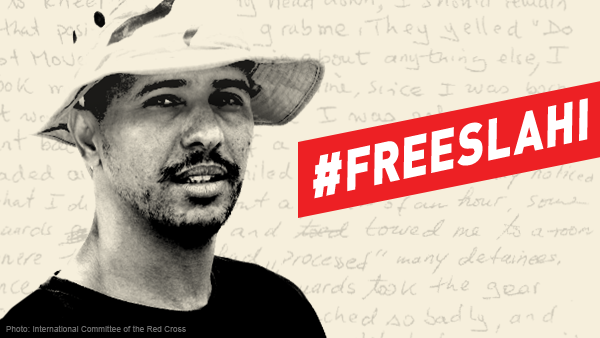ACLU Asks Court to Order Hearing for Imprisoned Guantánamo Book Author
Motion Also Asks Court to Instruct Prison Officials to Reverse Harsh Restrictions Recently Imposed On Mohamedou Slahi
WASHINGTON — The American Civil Liberties Union today asked a federal court to order the Defense Department to hold a long-delayed hearing to review the detention of Guantánamo prisoner Mohamedou Ould Slahi, a Mauritanian citizen who the U.S. has detained for more than 13 years without charge or trial.
The filing comes in Slahi’s habeas case challenging his detention. He is the author of the international best-selling memoir released this year, “Guantánamo Diary.” In 2011, President Obama issued an executive order establishing the “Periodic Review Board” process and giving the secretary of defense one year to hold hearings and review the cases of indefinitely held Guantánamo detainees. Nearly four years later, Slahi has yet to be scheduled for this hearing, despite numerous requests from his attorneys.
Today’s motion also asks the court to order an end to recent deprivations imposed on Slahi, such as the confiscation of family photos, legal papers, and the personalized gifts given to him by guards, which were described in his book. Prison officials have given no reason for their actions, which have deprived Slahi of the few comforts he possessed to cope with his prolonged and indefinite imprisonment.
“Mohamedou Slahi should never have been locked up in the first place. Both the Constitution and international law demand that he be given a chance to prove that he should be set free,” said Hina Shamsi, director of the ACLU National Security Project. “We’re asking the court to make the Obama administration follow its own rules, so an innocent man can finally go home after suffering for so long.”
An online petition demanding Slahi’s release has gathered nearly 50,000 signatures. Last week it was announced that the producers of Hollywood films including “Captain Phillips” and “Green Zone” have acquired the rights to turn Slahi’s book into a movie.
In 2010, the federal district judge in the case ordered Slahi released, but the Obama administration successfully appealed. The case was sent back to the district court with instructions to use looser standards to decide whether individuals can be held at Guantánamo. The matter is now awaiting further action from the district court.
The former chief prosecutor for the Guantánamo military commissions, Col. Morris Davis, has said that he was unable to find any evidence that Slahi had engaged in any acts of hostility against the United States. Another military prosecutor, Lt. Col. Stuart Couch, withdrew from the case after determining that the U.S. military extracted statements from Slahi by torture.
Slahi was born in Mauritania in 1970 and won a scholarship to attend college in Germany. In the early 1990s, Slahi fought with al-Qaeda when it was part of the Afghan anti-communist resistance supported by the U.S.. The federal judge who reviewed all the evidence in his case noted that the group then was very different from the one that later came into existence. He worked in Germany for several years as an engineer and returned to Mauritania in 2000. The following year, at the behest of the U.S., he was detained by Mauritanian authorities and rendered to a prison in Jordan. Later he was rendered again, first to Bagram Air Force Base in Afghanistan and finally, in August 2002, to the U.S. prison at Guantánamo, where he was subjected to severe torture.
Slahi was one of two so-called “Special Projects” whose treatment then Secretary of Defense Donald Rumsfeld personally approved. The abuse included beatings, extreme isolation, sleep deprivation, sexual molestation, frigid rooms, shackling in stress positions, and death threats against both Slahi and his mother.
Slahi’s book, the first and only memoir by a still-imprisoned Guantánamo detainee, was published from a 466-page handwritten manuscript. In January, after a years-long battle with government censors, the book was released in the United States with over 2,500 government redactions. It spent several weeks on the New York Times Best Seller list and has since been translated into multiple languages for publication in more than 25 countries.
Book excerpts and video and audio content are at:
http://www.guantanamodiary.com
Today’s motion is at:
https://www.aclu.org/sites/default/files/field_document/slahi_habeas_petition_-_motion_for_order_to_show_cause.pdf
Today’s supporting declaration about Slahi’s treatment is at:
https://www.aclu.org/sites/default/files/field_document/hollander_slahi_declaration_with_exhibits.pdf
More information on Periodic Review Boards is at:
https://www.aclu.org/blog/speakeasy/definite-end-indefinite-detention-within-reach



